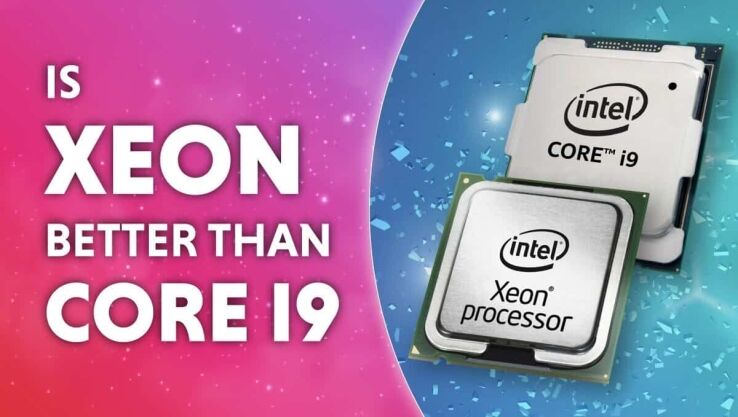Is Intel Xeon better than Core i9?
Is Intel Xeon better than Core i9? Let's find out

WePC is reader-supported. When you buy through links on our site, we may earn an affiliate commission. Prices subject to change. Learn more
Xeon and Core i9 are two popular families of processors from Intel. It can be a bit hard to differentiate between the two, though. In this article, we’re comparing Xeon and Core i9 to find out: Is Xeon better than i9?
Now Read: Best Intel CPU
Intel Xeon and Core i9 lineups compared
Here we will compare the two CPU families in question to determine the fastest one.
Intel Xeon
The Intel Xeon family features server-grade processors. Each chip is outfitted with an enormous amount of cores and threads that operate at moderate clock speeds. Xeon CPUs feature special technologies that are most beneficial in professional environments, making them ideal for server and workstation use.
Xeon has been around for quite a while now. Intel’s latest release introduced us to some pretty powerful units such as the Platinum 8490H, a chip with 60 cores, 120 threads, 114.5MBs of cache, a 350-watt TDP, and a $17000 recommended retail price. The retail price makes it pretty clear that Xeon is not intended for average consumers.
Intel Core i9
The Intel Core i9 family features Intel’s very best Core processors. These are consumer-grade CPUs offering a high core count, industry-leading clock speeds, and powerful specs overall.
We say high core count, but there’s really no comparison to be made with Xeon here. The Core i9-13900KS, for example, has 24 cores and 32 threads. That’s a lot by consumer-grade standards, but you could easily find an entry-level Xeon with more.
Core i9 processors do have much higher clock speeds than Xeon processors, though. The 13900KS has a 6.0GHz maximum clock speed, which is the current record at stock values and is noticeably higher than that of even the speediest Xeon processors.
Xeon vs Core i9: Gaming
Even though Xeons are much more expensive, Core i9 CPUs are the better processors for gaming. Games are CPU-intensive applications, but in-game performance is more sensitive to maximum clock speed than it is to core count.
The extra cores and threads boasted by Xeon CPUs don’t really do anything for them here. The comparison comes down to clock speed, in which department Core i9 CPUs have a firm lead.
Xeon CPUs still deliver decent gaming performance, but at a ridiculous price point. It’s important to understand that Intel never really intended for Xeons to be used in typical consumer applications such as games.
Xeon vs Core i9: Productivity
For productivity, Xeon processors win by a mile.
Core i9 features the best consumer-grade productivity processors in the entire industry. However, even these very powerful CPUs can’t come close to offering the same multicore performance that Xeons do.
The difference in multicore performance exists due to the large gap in core and thread count, of course.
Does this mean you should go with a Xeon if you’re looking for a processor for your personal workstation or productivity bench?
Not necessarily. While Xeons offer better raw performance than Core i9 in multicore-intensive workloads, they aren’t very cost-effective. If you’re a one-off professional (or even a small group), you will likely find better value in a modern Core i9 CPU.
Xeon’s are really only for businesses and organizations that know they need the raw performance offered by Xeon. They can afford to compromise on price efficiency in favor of raw performance and a few special features that yield benefits in niche environments.
Final word
In conclusion, choosing between Intel Xeon and i9 processors ultimately depends on your specific needs and use cases. If you require maximum performance for demanding tasks such as video editing or 3D rendering, the Xeon may be the better choice with its multi-core capabilities and support for ECC memory. On the other hand, if you prioritize high clock speeds for gaming or single-threaded applications, the i9 may be the better option.
Additionally, budget and power consumption should also be considered when making your decision. The Xeon tends to be more expensive and power-hungry than the i9, so it may not be the most cost-effective or energy-efficient choice for every use case.
Ultimately, both processors have their strengths and weaknesses, and it’s important to carefully evaluate your specific needs and priorities to determine which one is the best fit for you.